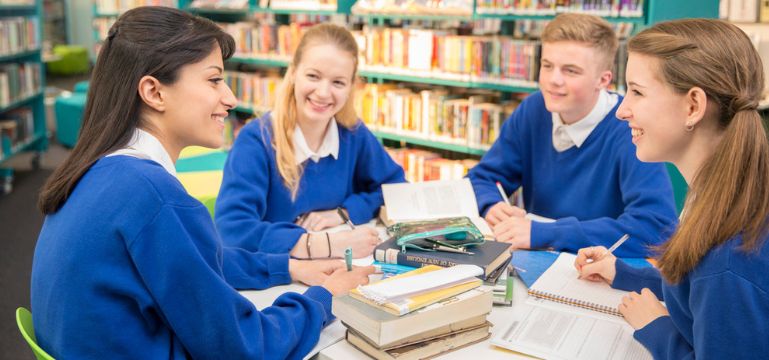The school’s work in relation to provision to develop pupils as responsible and informed citizens

Quick links:
Information about the school
Ysgol Maes y Gwendraeth is a Welsh-medium 11 – 18 school that is maintained by Carmarthenshire County Council. There are 1,108 students on roll, including 181 sixth-form pupils. The percentage of pupils who are eligible for free school meals is 12.3% and the percentage of pupils with additional learning needs is 17.5%.
Context and background to the effective or innovative practice
In order to strengthen and enrich curricular provision for all pupils, a Health and Well-being Coordinator was appointed to ensure that there are beneficial and valuable opportunities for pupils to develop as responsible, mature and informed citizens. A myriad of interesting and relevant experiences is provided for pupils through the personal and social education (PSE) and well-being programme. Opportunities for pupils to voice their opinions and lead and influence the school’s work, together with the guidance and experiences in relation to the next stages in their lives, particularly the world of work, also contribute to their development as informed citizens.
What impact has this work had on provision and learners’ standards
Over recent years, the school has placed a clear focus on developing health and well-being approaches in all aspects of its work. As a result, the school has promoted and ensured the best opportunities for all pupils to develop as resilient, informed and successful individuals. These valuable opportunities have ensured that there is a strong pastoral ethos and a friendly and welcoming atmosphere at Ysgol Maes y Gwendraeth.
Developing a rich and tailored programme to promote aspects of PSE across the curriculum has been an important part of the planning work. As part of the planning process, an audit was completed which provided an overview of the aspects that were already being delivered within the curriculum, in addition to identifying the aspect that needed to be developed further. Hand in hand with this, data from the School Health Research Network (SHRN), pupil feedback and information from close cooperation with the community were used to plan provision. For example, work with the local police enables the school to respond to important local issues, in addition to taking part in local campaigns, such as organising a food bank within the school. This means that staff can plan coherently for a relevant curriculum that responds to issues that arise within pupils’ experiences. Through the wellbeing lessons, morning well-being sessions and assemblies, the school supports and enriches pupils’ spiritual, moral, social and cultural development through themes such as healthy relationships, anti-bullying, vaping and mental health. As a result, pupils develop as informed citizens who are able to discuss various issues confidently and maturely. In line with this, the school makes good use of external agencies such as Brook, Young Carers, Choices and Impact 242 to strengthen provision further.
The ‘Llais Maes’ forums have a prominent place in the school’s work. They provide valuable opportunities for pupils to express their opinions, lead well-being and whole-school activities and develop leadership skills by assuming responsibilities that have a positive influence on the school’s life and work. The effectiveness of the ‘Llais Maes’ forums ensures that the school promotes pupils’ views clearly and this leads to valuable changes, such as revising the anti-bullying policy, increasing the number of benches on the playground and developing a project to introduce a sensory resource. Pupils lead an LGBTQ+ club and support pupils through the ‘Camu’ scheme, where sixth-form pupils support younger pupils with their numeracy and reading skills. Forum representatives summarise their work and actions effectively by giving updates to their fellow pupils during the morning wellbeing sessions and assemblies and in the termly ‘Llais Maes’ newsletters that are shared with stakeholders through various social media. As a result of these strong practices, pupils feel that the school considers their views and acts on their ideas.
Preparing pupils for the next stages in their development, whether at school, college or the world of work, is also an important part of PSE provision. The well-being and interest of pupils are always at the heart of provision as, and a result, impartial and relevant advice is provided to all individuals. There are comprehensive systems to support pupils when they join the school in Year 7 and this helps them to settle without fuss. As they choose their option subjects in Years 9 and 11, the school provides pupils with useful information and guidance so that they can make informed choices about their future. The school organises ‘Llwybrau Llwyddiannus’ evenings and taster sessions, which provide pupils with valuable information about post-14 and post-16 pathways. A week of work experience is also promoted and Year 10 and 12 pupils take full advantage of this experience. The school has developed valuable relationships with various external and local companies that support its work and enrich pupils’ experiences and awareness, such as Careers Wales, a local food business and the National Botanic Garden.
How have you shared your good practice?
The school has shared its good practice by promoting its work with a variety of stakeholders and through different media. The school website includes ‘Llais Maes’ newsletters and the school’s Health and Well-being social media account promotes and celebrates rich provision throughout the year. Social platforms are used regularly to promote the work and pupils are a central part of everything.